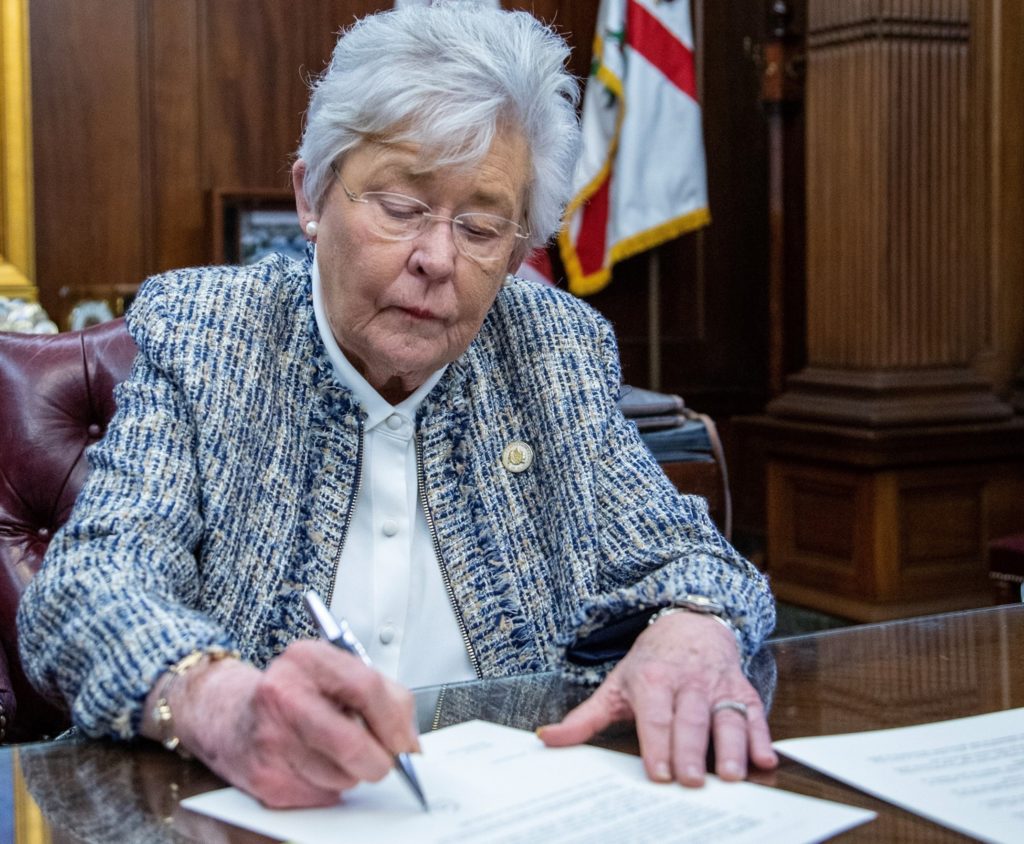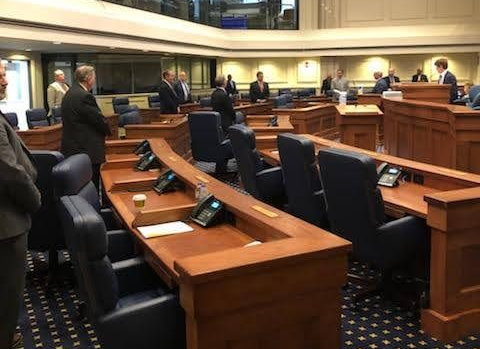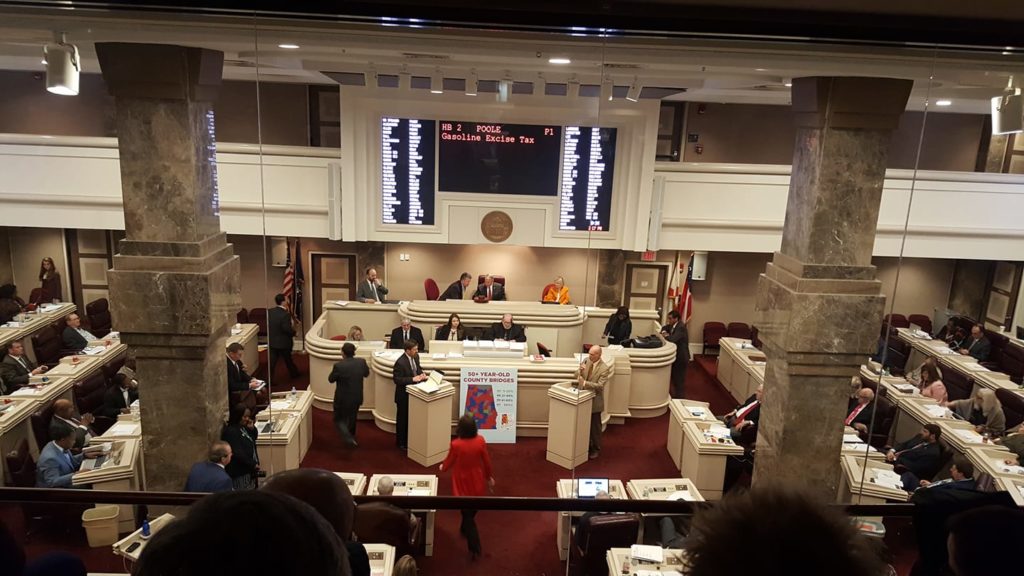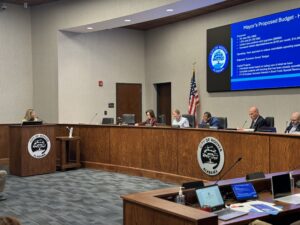Governor will host a ceremonial bill signing for legislation passed during 2023 Regular Session

On Tuesday, Alabama Governor Kay Ivey will host a series of bill-signing ceremonies to celebrate the passage of several pieces of legislation that addressed concerns facing the state of Alabama. Ivey will sign several bills, including reform of the state’s adoption laws. House Bill 101 (HB 101) is sponsored by State Representative Ginny Shaver and State Senator Arthur Orr. This bill streamlines the state’s adoption process and updates the current adoption law language. (Act 2023-092). “Alabama has consistently set state records for adoptions and placed thousands of children in loving, forever homes,” said Gov. Ivey. “Currently, we have more than 5,000 children in the foster care system, and with this modernized and streamlined process now in place, we have positioned Alabama on even firmer footing and will be able to provide more of our children with the life they deserve.” House Bill 66 (HB66) by Rep. Joe Lovvorn and Sen. Andrew Jones allows certain firefighters, law enforcement officers, and correctional officers, covered under the ERS or TRS, to purchase hazardous duty time for prior service. (Act 2023-101). HB66 removes the time limitations for Tier I firefighters, law enforcement officers, and correctional officers covered under the Employees’ Retirement System or the Teachers’ Retirement System to purchase eligible service credit prior to January 1, 2003. House Bill 164 (HB164) by Rep. Andy Whitt and Sen. Jay Hovey requires high school students to complete a personal financial literacy and money management course before graduation. (Act 2023-179). “I have got story after story from thirty years of banking experience of young people who did not have a checking account,” said Whitt. “They go to convenience stores and check cashing places to get their paychecks cashed. One young fellow was working two hours a week just to be able to get his check cashed each week.” Senate Bill 131 (SB 131) by Sen. Vivian Figures and Rep. Steve Clouse. This bill transfers the regulation of preneed funeral contracts from the Department of Insurance to the Alabama Board of Funeral Services. (Act 2023-094). The Alabama Preneed Funeral and Cemetery Act of 2023 transfers the existing Preneed Funeral and Cemetery Act and the regulation of preneed contracts from the Commissioner and Department of Insurance to the Alabama Board of Funeral Service. It authorizes the Department of Insurance to temporarily transfer certain funds to the board to defray costs associated with the administration and operation of the Alabama Preneed Funeral and Cemetery Act of 2023; Senate Bill 28 (SB28) by Sen. Tim Melson and Rep. Randy Wood would expand the scope of practice of podiatry to include treatment of the foot and ankle. (Act 2023-106). Podiatrists in most states are already allowed to treat disorders of the ankle. This expansion of the scope of practice to come in line with national standards was long overdue. Senate Bill 104 (SB 104) by Sen. Chris Elliott and Rep. David Faulkner revises the current Dram Shop Act by addressing liability for providers of alcohol if a recipient injures a third party. (Act 2023-025) . Before this, only three insurance carriers would insure restaurants and bars from lawsuits due to the liability. This will make it harder for plaintiffs’ attorneys to prove a case against the establishment that sold the alcohol. House Bill 56 (HB56) by Rep. Frances Holk-Jones and Sen. Linda Coleman-Madison will expand the scope of practice for licensees of the Alabama Board of Social Work Examiners. (Act 2023-100). This will allow specially trained social workers with master’s degrees to diagnose mental illnesses. House Bill 62 (HB 62) by Rep. Ben Robbins and Sen. Keith Kelley will extend the amount of time that nonprofit veterans’ organizations have to comply with state and local building codes when acquiring a former armory building. (Act 2023-175). This bill primarily deals with an armory in Sylacauga owned by the American Legion and used by the Alabama National Guard. When the National Guard shut down its presence, it transferred back to the American Legion. The NG never updated the building during its tenure, so it lacks the sprinkler system needed to comply with state building code requirements. Tuesday will be day 24 of the 2023 Alabama Regular Legislative session. Kay Ivey has been governor since 2017. To connect with the author of this story or to comment, email brandonmreporter@gmail.com.
Legislature passes bill allowing social workers to diagnose mental illness

On Tuesday, the Alabama Senate State voted 32 to 0 to pass legislation allowing certain highly trained social workers to diagnose mental illnesses. The bill had already passed the House of Representatives 104 to 1. House Bill 56 (HB56) is sponsored by State Representative Frances Holk-Jones. It was carried in the Senate by State Senator Linda Coleman-Madison. HB56 has already passed the House 104 to 1. Sen. Coleman-Madison said, “It gives me great pleasure to present this bill.” “There is a limited number of social workers in our state,” Coleman-Madison said. “This will expand their scope of practice.” “We need social workers in the state,” Coleman-Madison said. “I am very supportive of the bill,” Sen. Will Barfoot said. “My Aunt is in the Social Worker Hall of Fame.” Barfoot said that his daughter is in her final year of college to be a social worker. “There is a huge need for social workers in our state: geriatric, veterans, in the schools, and working with mental health,” Barfoot explained. Sen. Dan Roberts said, “I congratulate you for working on this bill.” Rep. Holk-Jones explained to the Senate State Governmental Affairs Committee that “Alabama is currently the only state that does not allow” these highly trained social workers to diagnose mental illness. “We are losing these social workers to other states,” Holk-Jones said. “This allows people to get diagnosed and treatment without traveling to see a medical professional.” Sen. Coleman-Madison sponsored the Senate version of the bill, SB109, which had already passed the Senate. SB109 likely will remain in committee as the House version has already passed both Houses. The legislation expands the scope of practice of a licensed independent clinical social worker, including the authority to diagnose and develop treatment plans. “The scope of practice does not include the diagnosis, treatment, or provision of advice to a client for problems or complaints relating to conditions outside the boundaries of the practice of social work.” The legislation states that no individual may engage in the independent clinical practice of social work unless they satisfy all of the following: (1) Licensed is licensed under this chapter as a licensed independent clinical social worker; and. (2) Has a doctorate or master’s degree from a school of social work approved, accredited, or in candidacy granted by the Council on Social Work Education; and. (3) Has had two years of full-time or three years of part-time postgraduate experience under appropriate supervision in the specified social work method or four years of full-time or five years of part-time postgraduate experience under appropriate supervision in the specialty in which the applicant will practice. (4) Has passed an examination prepared by the board for this purpose; except that prior to the time that an examination is prepared by the board for this purpose, no person individual who otherwise meets the requirements of this section will be prohibited from engaging in the private independent practice of social work; and. (5) Has been issued by mail a certified letter of certification stating his or her qualification for private independent practice by the board; and. (6) Has paid an initial certification fee set by the board. “The terms diagnose and treatment, whether considered in isolation or in conjunction with the rules of the board, may not be construed to permit the performance of any act which a licensed clinical social worker is not educated or trained to perform including, but not limited to, any of the following: (1) Administering and interpreting psychological tests or intellectual, neuropsychological, personality, or projective instruments. (2) Admitting any individual to a hospital for treatment of any condition that is outside the boundaries of the practice of social work, as provided in subsection (b). (3) Treating any individual in a hospital setting without medical supervision. (4) Prescribing medicinal drugs. (5) Authorizing clinical laboratory procedures or radiological procedures. (6) Using electroconvulsive therapy. The state of Alabama has a significant shortage of mental health professionals. Coleman-Madison said, “I am carrying this for Rep. Holk-Jones. I think this is her first bill.” Since HB56 has been passed in both Houses in the same form, the legislation now goes to Gov. Kay Ivey for her consideration. Tuesday was day 14 of the 2023 Alabama Regular Legislative Session. To connect with the author of this story or to comment, email brandonmreporter@gmail.com.
Senate Committee advances legislation to allow some social workers to diagnose mental illness

The Alabama Senate State Government Affairs Committee voted to advance legislation allowing certain highly trained social workers to diagnose mental illnesses. House Bill 56 (HB56) is sponsored by State Representative Frances Holk-Jones. HB56 passed in the House 104 to 1. Holk-Jones explained that “Alabama is currently the only state that does not allow” these highly trained social workers to diagnose mental illness. “We are losing these social workers to other states,” Holk-Jones said. “This allows people to get diagnosed and treatment without traveling to see a medical professional,” Holk-Jones continued. Holk-Jones said that this would also enable people to get treatment via telehealth. Sen. Dan Roberts asked, “Is this the same bill that Senator Coleman Madison had that we passed out?” Holk-Jones said yes. The Senate version is SB109. SB109 has passed the Senate and has been referred to the House Health Committee. Sen. Robert Stewart said, “I want to say that I have a therapist. He is out of Maryland.” Stewart expressed his support for the bill and telehealth. Sen. Merika Coleman asked, “Has there been any pushback at all?” Holk-Jones answered, “No.” State Sen. Tom Butler chairs the Senate State Governmental Affairs Committee. The legislation expands the scope of practice of a licensed independent clinical social worker, including the authority to diagnose and develop treatment plans. “The scope of practice does not include the diagnosis, treatment, or provision of advice to a client for problems or complaints relating to conditions outside the boundaries of the practice of social work.” The legislation states that no individual may engage in the independent clinical practice of social work unless they satisfy all of the following: (1) Licensed is licensed under this chapter as a licensed independent clinical social worker; and. (2) Has a doctorate or master’s degree from a school of social work approved, accredited, or in candidacy granted by the Council on Social Work Education; and. (3) Has had two years of full-time or three years of part-time postgraduate experience under appropriate supervision in the specified social work method or four years of full-time or five years of part-time postgraduate experience under appropriate supervision in the specialty in which the applicant will practice. (4) Has passed an examination prepared by the board for this purpose; except that prior to the time that an examination is prepared by the board for this purpose, no person individual who otherwise meets the requirements of this section will be prohibited from engaging in the private independent practice of social work; and. (5) Has been issued by mail a certified letter of certification stating his or her qualification for private independent practice by the board; and. (6) Has paid an initial certification fee set by the board. “The terms diagnose and treatment, whether considered in isolation or in conjunction with the rules of the board, may not be construed to permit the performance of any act which a licensed clinical social worker is not educated or trained to perform including, but not limited to, any of the following: (1) Administering and interpreting psychological tests or intellectual, neuropsychological, personality, or projective instruments. (2) Admitting any individual to a hospital for treatment of any condition that is outside the boundaries of the practice of social work, as provided in subsection (b). (3) Treating any individual in a hospital setting without medical supervision. (4) Prescribing medicinal drugs. (5) Authorizing clinical laboratory procedures or radiological procedures. (6) Using electroconvulsive therapy. The state of Alabama has a significant shortage of mental health professionals. The Committee voted to give HB56 a favorable report without amendment. It could be considered by the full Senate as early as Tuesday. Through Friday, 618 bills have been introduced in the legislative session. Tuesday will be day 14 of the 2023 Alabama Regular Legislative Session. To connect with the author of this story or to comment, email brandonmreporter@gmail.com.
State House passes legislation allowing some social workers to diagnose mental illness

On Tuesday, the Alabama House of Representatives passed legislation allowing certain social workers with master’s degrees to diagnose mental illnesses. House Bill 56 (HB56) is sponsored by State Representative Frances Holk-Jones (R-Foley) The synopsis states, “This bill would provide further for the scope of practice of licensees of the Alabama Board of Social Work Examiners.” The legislation expands the scope of practice of a licensed independent clinical social worker, including the authority to diagnose and develop treatment plans. “The scope of practice does not include the diagnosis, treatment, or provision of advice to a client for problems or complaints relating to conditions outside the boundaries of the practice of social work.” The legislation states that no individual may engage in the independent clinical practice of social work unless they satisfy all of the following: (1) Licensed is licensed under this chapter as a licensed independent clinical social worker; and. (2) Has a doctorate or master’s degree from a school of social work approved, accredited, or in candidacy granted by the Council on Social Work Education; and. (3) Has had two years of full-time or three years of part-time postgraduate experience under appropriate supervision in the specified social work method or four years of full-time or five years of part-time postgraduate experience under appropriate supervision in the specialty in which the applicant will practice. (4) Has passed an examination prepared by the board for this purpose; except, that prior to the time that an examination is prepared by the board for this purpose, no person individual who otherwise meets the requirements of this section will be prohibited from engaging in the private independent practice of social work; and. (5) Has been issued by mail a certified letter of certification stating his or her qualification for private independent practice by the board; and. (6) Has paid an initial certification fee set by the board. “The terms diagnose and treatment, whether considered in isolation or in conjunction with the rules of the board, may not be construed to permit the performance of any act which a licensed clinical social worker is not educated or trained to perform including, but not limited to, any of the following: (1) Administering and interpreting psychological tests or intellectual, neuropsychological, personality, or projective instruments. (2) Admitting any individual to a hospital for treatment of any condition that is outside the boundaries of the practice of social work, as provided in subsection (b). (3) Treating any individual in a hospital setting without medical supervision. (4) Prescribing medicinal drugs. (5) Authorizing clinical laboratory procedures or radiological procedures. (6) Using electroconvulsive therapy. Rep. Holk-Jones explained that the licensed clinical social workers would mostly do counseling. “Prescribing would be done by a doctor.” Rep. Thomas Jackson said, “We have outsourced mental health to the Department of Corrections. They don’t know anything about mental health. We need to get some of those people out of the prisons and into treatment.” Rep. Tim Wadsworth said, “This will allow people in our rural areas to get help quicker.” Holk-Jones said, “It will make it quicker and also bring telehealth into it.” State Rep. Mary Moore questioned if the social workers were competent to make psychiatric diagnoses. Holk-Jones said, “They have a master’s degree in social work and 3000 hours of clinical training. This is all part of the social worker training.” Moore said, “We have got people who are deficient doing clinical diagnosing.” Holk-Jones said, “They are trained to do that. If they need a prescription, they go to a doctor.” Moore said, “You can damage a person for life if they don’t have the proper training to diagnose someone. What some of us call a mental condition is not. We could misdiagnose someone with a condition they don’t have. I would like them to train under a psychiatrist before they start diagnosing someone.” State Rep. Barbara Drummond said, “This hits me raw because I lost a great nephew on Easter Sunday to suicide. He was a veteran.” Drummond said, “The more we can do about mental health in the state, the better.” Holk-Jones said, “This will not be the last time we talk about it.” HB56 passed 104 to 1. HB56 now goes to the Senate for their consideration, where it has been referred to the Senate State Governmental Affairs Committee. To connect with the author of this story or to comment, email brandonmreporter@gmail.com.
Steve Flowers: Women rule in Alabama politics

For many years, Alabama has been ridiculed in national publications for having fewer women in political leadership positions than others assumed to be progressive states. States like Colorado, New York, and California were lauded for having an inordinate number of females in public office. Well, folks, take a cursory look around at Alabama’s political landscape, and it is a new day in the Heart of Dixie, and unlike the above-mentioned liberal states, our slate of women leaders are conservative Republicans. Our top two most powerful leaders in the state are Governor Kay Ivey and U.S. Senator Katie Britt. If you include PSC President Twinkle Cavanaugh into the mix, then the three most powerful and popular political leaders in the Heart of Dixie are women Republicans. You can eat your heart out, Colorado. This day did not just happen. These three women have been on the scene and the horizon for a while and arose the old-fashioned way by rising through and within the system to get to the top of the class. Kay Ivey was a student leader at Auburn. She spent a decade or more working with the legislature as the lobbyist for the Alabama Commission on Higher Education; then ran for and was elected State Treasurer and served eight years. She then was elected Lt. Governor, where she served for six years. She has been governor now for almost six years. Twinkle Cavanaugh has been on a leadership track since her high school years in Montgomery. She became Chairman of the Alabama Republican Party at a young age and has been President of the Public Service Commission for over a decade. She is the hardest working political figure in office in Alabama with a hardcore grassroots organization. Katie Britt also won our U.S. Senate seat the old-fashioned way. She worked hard and built a statewide grassroots organization that will hold her in good stead for years to come. All three of these ladies are conservative yet rational and reasonable leaders. They are exemplary of Southern grace, yet decisive, disciplined, and dignified. They are people we can be proud of and excellent role models. All three are Alabama born and bred and know the folks of Alabama. All three are closely aligned with and have proudly been supported by Alabama’s premier and most powerful and respected political organization, the Alabama Farmers Federation (Alfa). Currently, two of the most prominent jurists on the Alabama State Supreme Court are females. Justices Kelli Wise and Sarah Stewart grace the Court. I can see our Supreme Court in Alabama, as well as the United States Supreme Court, being majority female in future years. The majority of law students and graduates throughout the country are female. Women will dominate this profession in the next decade, if not already. The State Senate has two very prominent female leaders. The most powerful and proficient is veteran Mobile State Senator Vivian Figures. Senator April Weaver from Bibb/Shelby is on a fast track in the Alabama Senate. Another sign of women taking their rightful place in the Alabama Legislature is the takeover of Republican House Seats in the Shelby and Baldwin County Republican suburban districts. There were five new Republican women in these two Republican bastions that all took seats previously held by older men. Susan Dubose and Leigh Hulsey will be joining three females from Baldwin County. All three of the Baldwin County GOP seats will be held by female Republicans, including Jennifer Fidler, Donna Givens, and Frances Holk-Jones. Representative Cynthia Almond (R-Tuscaloosa), a relative newcomer, is a star on the horizon. Three of the most prominent leaders in the House of Representatives are women. Representative Margie Wilcox of Mobile is in a leadership position. Representative Ginny Shaver of Cherokee County works extensively on family and adoption issues. Representative Terri Collins of Morgan County is the education guru in the Alabama House. Speaking of education, our Alabama State Board is currently made up of eight female members and only one man. This eight-to-one female majority really becomes nine-to-one because Governor Kay Ivey serves as ex-officiate Chairman of the Board of Education. So, folks, as you can see, women rule in Alabama politics, and my guess is that this trend will not diminish in years to come. See you next week. Steve Flowers is Alabama’s leading political columnist. His weekly column appears in over 60 Alabama newspapers. He served 16 years in the state legislature. Steve may be reached at www.steveflowers.us.


